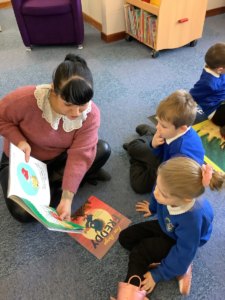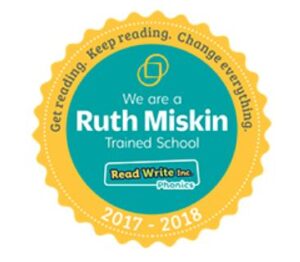READING
At Alderman Cogan’s CE Primary Academy, we want our children to be the best that they can be. We want to give them the best possible chances in life and one important way we can do this is to encourage every child to be a reader.
Read Write Inc.
We are excited to be part of the Read Write Inc. team of schools. Read Write Inc. has a long history of proven success and we have seen the positive impact on our children’s confidence to read from day one. The simple assessment, clear tracking and straightforward grouping ensures that every child learns rapidly at the right level.
Please follow this link for videos to help you support your child at home: http://www.ruthmiskin.com/en/parents/
Read Write Inc: parent presentation
Fresh Start
Read Write Inc. Fresh Start is a phonics intervention that gets the struggling readers at the expected level for secondary school.
- It gets children reading and writing fluently in 33 lessons.
- It uses rigorous assessment so every child is taught at the right level.
- It engages older children with age-appropriate comic strips, quizzes, amusing stories and edgy non-fiction texts.
INFERENCE GROUPS
Inference training is a group intervention for pupils in Year 6 who are able to decode but struggle to get full meaning and enjoyment from their reading.
Children who struggle with comprehension may:
- focus on individual words/sentences
- attach most importance to decoding each word
- read without taking all the meaning in
- not always expect that the text they read should make sense and don’t know how to check understanding as they go along
- read fewer books and don’t always understand story structure
- not use what they already know or have seen to help them understand
- have a less efficient working memory
Effective readers:
- know that understanding is the goal of reading
- use background knowledge, experiences and working memory as they read
- make inferences to get the gist of the text
- have high expectations of the text making sense
- make predictions, ask their own questions and watch out for “answers” as they read
- can picture what is happening in the story when appropriate
- monitor meaning, as they read and notice when the meaning is lost and use strategies to make the test make sense again
- read frequently and enjoy reading
Inference lessons demonstrate key comprehension strategies through “instructional conversations” in groups to help boost reading comprehension. Through reading and interactive discussions, the group:
- think about what they already know, apply it to their reading and use title cues to predict
- identify key words and elaborate on them to enhance meaning, and develop vocabulary
- generate their own questions and answer them
- generate inferences and build meaning into the text as they read to build a gist
- summarise a short text extract by picturing the scene or event, using quick pictures, picto-words and a 10 word or less headline
- retell an extract to emphasise the gist
Inference materials include short text extracts for KS2 pupils, many of which are from recent award winning titles which have been carefully chosen to contain rich opportunities for the pupils to discuss and enjoy. Further readings of the novels take place so that pupils can apply their skills to whole texts.
Intervention for groups consists of four pupils taught by teaching assistants or teachers for two sessions of 40 minutes a week for ten weeks.
OUR SCHOOL LIBRARY
We are fortunate to have developed a new library with the support of Hull Library Service over the Autumn term. During each reading cycle the children will have the opportunity to visit the school library. In the Summer term ‘book picnics’ are available for children to share on our field.

READING AT HOME
Reading at home is vital in enabling children to become fluent readers. If a child reads at least three times a week they can earn prizes during the school year.
TIPS FOR READING TO YOUR CHILD
Reading to your child does not have to mean reading a book – it could be an article from one of their magazines, or a newspaper with older children.
Likewise, telling your child stories does not mean that you need to have a book in front of you – made-up stories can be just as much fun! To involve your child in the story, you could even get them to tell you 3 objects they want to be mentioned in the tale. They can then have fun trying to spot where they come into the story.
Below are some video clips with tips on reading to your child. Follow the links to find out more:
-Bedtime stories – Michael Rosen (We’re going on a bear hunt): http://www.wordsforlife.org.uk/michael-rosen-tips-reading-bedtime-stories
-The British Council shows examples of how to read with your child: http://www.britishcouncil.org.sg/en/features/reading-your-children
-Reading to your child by reading specialist Anne Glass:
http://www.howcast.com/videos/460482-How-to-Read-with-Your-Child
-Also, check out these pages from the Reading Recovery website for children aged 3-7: http://readingrecovery.ioe.ac.uk/advice/27.html
If you have any questions about reading to your child, please do not hesitate to contact Mrs Oliver.
Disclaimer:
We are not responsible for any content posted on external sites. Please make sure an adult is always present when your child is on the internet.
TIPS FOR LISTENING TO YOUR CHILD READ
Every day your child will bring a Home Reader home from school. This is a book that is at the correct level for them to enjoy and practise the skills they have been learning in class. Please do not feel that this is the only text your child should read, though – they can read other books, magazines, newspaper articles, websites (with adult supervision), and anything else that is available and appropriate. The most important point is that they read and enjoy it.
It is really important to listen to your child read as regularly as possible, no matter what their level of reading is. It is also important to ask them 2-3 comprehension questions at the end of their reading, too, to make sure that they understand what they are reading and to help them to develop their comprehension skills.
If you have any questions about listening to your child read, please speak to Mrs Oliver.
WALKING THROUGH A BOOK
When children pick up a book, it is important that they know what the main ideas are before they attempt to read it – just like we, as adults, suss out a book before we decide to read it by reading the blurb (information on the back of the book), looking at the front cover and maybe having a quick look at the way the pages are laid out inside.
With younger children, walking through a new book would consist of:
- telling them what the title of the book is
- identifying the names of the main characters (pointing to the characters in the pictures and finding the names in the text so that they are not thrown when they come across these words)
- discussing what is happening in the pictures
- working on 2-3 words together that may be hard for your child but that, with help, they can work out
- picking out 1-2 phrases to practise reading with expression – model the phrase yourself first using your story voice and then get your child to practise
Never read a whole sentence to your child as we do not want them to think that reading and remembering a text are the same thing.
After you have walked through the book with your child, get them to have a first read of the book or section of the book that you have looked at. Remember, it won’t be perfect and they may need to problem-solve to get to the correct response. If they are stuck prompt them to sound out the word, look at the pictures, think about what sounds right or use their finger, as appropriate. Try to get them to solve it before you step in – remember, if we are given something to read out loud, we like to practise it first. This is your child’s practise time.
Finally, remember to praise them. Tell them two things that you really liked about their reading or how they solved a problem. If they feel good about their reading, they will be more likely to want to read the book to you a second time tomorrow.
If you have any questions about walking through a book with your child or would like to see a live example, please do not hesitate to contact Mrs Oliver.
YOUR LOCAL LIBRARY
Going to the library can be a fun and free way to spend quality family time together. Why not get into the habit of going together regularly and choosing lots of books to read as bedtime stories as well as on your own?
Our nearest library is in the Freedom Centre on Preston Road.
Follow the link below to find out about this and other libraries in our area and their opening times.
http://www.hullcc.gov.uk
Did you know…? You can also use the internet for free for up to an hour a day at all Hull libraries!
Disclaimer:
We are not responsible for any content posted on external sites. Please make sure an adult is always present when your child is on the internet.
Links to Other Websites
http://www.wordsforlife.org.uk



